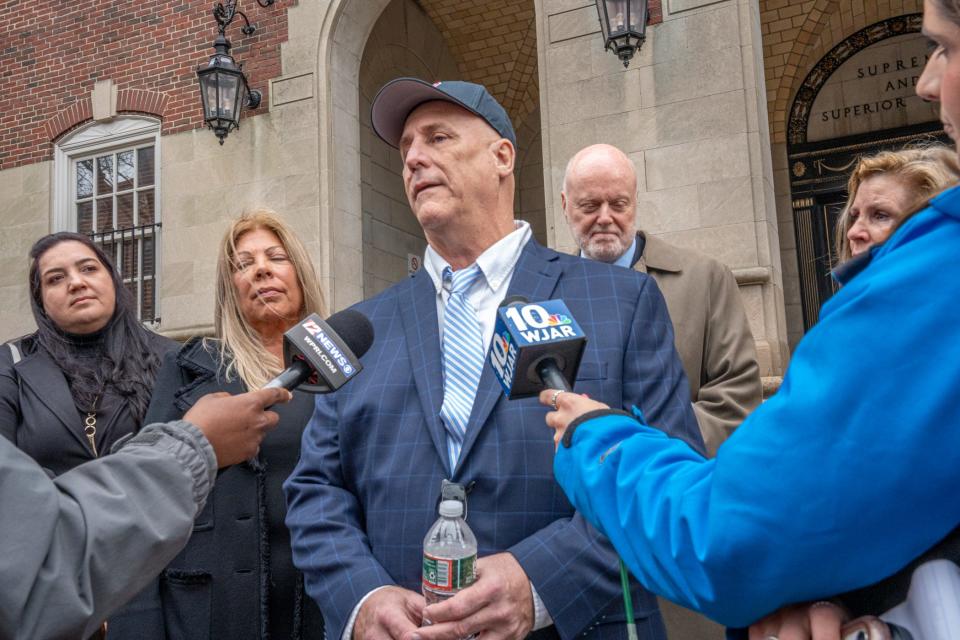Rhode Island has paid thousands to the wrongfully convicted. These are their stories
PROVIDENCE – Their stories are the stuff of nightmares.
Years spent in prison for crimes they did not commit or, in some cases, convictions the state was forced to dismiss in light of new evidence, despite prosecutors' doubts about their actual innocence.
In the last two years, the state paid $1,284,487 (including $38,561 for attorney fees) to five "wrongfully convicted" people who, between them, spent more than 30 years behind bars in Rhode Island.
“I’m sure you’ve all been accused of something you didn’t do, like cheating on a test or taking something that wasn’t yours,” former Warwick police Detective Jeffrey Scott Hornoff said to a packed audience in 2018. “Now just imagine being accused of murdering someone.”
More: She was wrongfully convicted of killing her toddler daughter. Now, she wants RI to pay her
Rhode Island has a law for compensating the wrongfully convicted
The payments were made under the auspices of a 2021 law sparked by Hornoff's high-profile case that provides a redress of up to $50,000 for each year spent in prison by someone who was wrongfully convicted.
Earlier this year, the state paid Hornoff $319,452.05 (and the Dimitri Law firm another $7,969.12) for the six years, four months and 18 days he spent in prison for a murder to which another man confessed while Hornoff was behind bars.
Hornoff was one of 11 people who petitioned the state for compensation.

Not all have been successful. Two bids for the money were rejected. The state is fighting the payment of any compensation to Kimberly Mawson, whose murder conviction for the death of her 19-month-old daughter, Jade, was tossed.
The five who won compensation for being wrongfully convicted were:
Paul Courteau
Jeffrey Scott Hornoff
Dionisio Polanco
Christopher Moran
Emil Carsetti
Who has been compensated in Rhode Island for wrongful convictions?
Some of their names are better known than others among Rhode Island crime followers.
Jeffrey Scott Hornoff:
Time spent in prison: 6+ years
Amount compensated: $319,452 (plus $7,969 in attorney fees)
A co-worker found Victoria Cushman, 29, bludgeoned to death in her apartment. Police then found a letter she previously wrote, but did not send, to the married Hornoff about wanting to continue their relationship.
Hornoff's initial lies about his relationship with Cushman made him the top suspect. A jury convicted him of first-degree murder in 1996.
Six years later another man, Todd Barry, who'd been Cushman's sometime boyfriend, confessed to killing her, and Hornoff was released from prison.
Hornoff sued the City of Warwick and the state in federal court, alleging errors in the murder investigation. He subsequently withdrew his lawsuit against the state police.
The City of Warwick agreed to pay Hornoff $600,000 and give him a disability pension, which currently pays him $72,096.72 a year, according to the city.
Paul Courteau
Time spent in prison: 13 years
Amount compensated: $557,945 (plus $6,435 in attorney fees)
A jury convicted Courteau in 1981 of participating in the armed robbery of a North Providence jewelry showroom the previous year. One of the owners identified Courteau from a photo lineup — on the third attempt.

Courteau served 13 years at the Adult Correctional Institutions until John Burke, a convicted murderer and habitual bank robber about to enter the federal witness protection program, admitted to a lifetime of crimes, including, with another accomplice, the North Providence jewelry robbery that had sent Courteau to prison.
Courteau was exonerated in 1999.
On the day Presiding Justice Alice Gibney approved his petition for compensation, Courteau told assembled reporters: “I’m grateful now, but for the years I suffered and my family suffered, and all the other people who have been wrongfully convicted, it’s just horrific that things like that can happen in life.”
Emil Carsetti
Time spent in prison: 1 year, 11 months
Amount compensated: $99,762 (plus $4,950 in attorney fees)
Carsetti, now 80 years old, was convicted a half century ago of setting a 1969 fire that did extensive damage to the north wing of the Adult Correctional Institutions while he was doing time for an unrelated breaking and entering.
He served part of his 15-year sentence for the fire between May 1971 and August 1973. Along the way, one of the other defendants, Gennaro D'Amico, signed an affidavit dated March 12, 1970, "inculpating himself and exculpating the other two defendants," according to an Aug. 2, 1973, Rhode Island Supreme Court opinion.
The high court vacated Carsetti's conviction.
In the 50 years since, Carsetti has had numerous other run-ins with the law and was in and out of prison – leaving the ACI for the last time in July 2012. He currently faces an assault charge.
Dionisio Polanco
Time spent in prison: about 2 years, 9 months
Amount compensated: $138,493 (plus $15,000 in attorney fees)
Polanco was convicted in the Aug. 13, 2005, beating of 32-year-old Fernando Fernandez with a pool cue at the Mi Sueño nightclub in Providence.
Fernandez could not identify his attacker. A waitress identified 38-year-old Polanco as the man who hit Fernandez. Polanco was convicted of felony assault on July 30, 2008, and sentenced to 10 years in prison.
In September 2010, Polanco sought a new trial after two new witnesses came forward. They didn’t identify the man who hit Fernandez, but they said it wasn’t Polanco.
Inexplicably, the witnesses said they had given statements to this effect to police "in the immediate aftermath of the assault."
Polanco was released from prison in April 2011. In June of that year, a judge vacated his conviction.
Christopher Moran
Time served in prison: about 2 years, 8 months
Amount compensated: $130,273 (plus $4,207 in attorney fees)
Moran, his brother – a former Central Falls police officer – and a cousin were indicted for an April 1992 robbery described this way in a court summary:
"Two armed, masked men shattered the usual early morning quiet at Rick's Pub (Rick's) in Central Falls when they burst into the bar; ordered the manager, her husband, and another pub employee to the floor; and threatened to kill anyone who looked at them."
The robbers made off with $25 and then holed up in an apartment, where they held more than 70 police officers at bay for four hours until surrendering.
Then-Judge John P. Bourcier, renowned for his stiff sentences, handed down staggering penalties, including a 68-year sentence for Chris Moran, who ended up serving a part of the sentence between Dec. 16, 1994, and July 25, 1997.
His conviction was reversed by the Rhode Island Supreme Court in an opinion dated July 25, 1997.
Among the Supreme Court's conclusions: The state failed to produce any witnesses who could identify Chris as one of the holdup men responsible for the Rick's Pub robbery.
"A witness did pick Chris's photo out of an array as one matching a “general description” of the robber he saw. But he told the police (and later the jury) that he could not positively identify Chris as one of the two bar thieves. And Chris's presence during the apartment standoff does not prove that he was present during the pub's pilfering or in the getaway car. "
Whose wrongful conviction petitions have been denied?
Two petitions for money were denied. Four are pending, including that of Kimberly Mawson.
The state has vigorously objected to Mawson’s bid to be compensated for the two years and 190 days she served behind bars for what she argues was her wrongful conviction in her toddler’s December 2002 death.
She is seeking $133,527 in compensation and legal fees.
Mawson insists she isn’t responsible for the death of her only child, citing statements allegedly made by her ex-boyfriend’s lawyer as her proof.
More specifically, lawyer Richard Corley told the Supreme Court's disciplinary counsel in 2010 of a conversation he'd had with Mawson's ex-boyfriend, Daniel Fusco, in December 2002 in which Fusco allegedly told him that he had squeezed the baby until she stopped breathing and was responsible for her death.
Fusco subsequently denied having made that statement, but it led the state to dismiss the charges against Mawson.
In fighting her bid for compensation, the state argues the law is intended to assist “innocent persons who have been wrongfully convicted of crimes through no fault of their own." In this case, the state contends, it was Mawson’s own lies and inconsistencies that led to her conviction.
Mawson's lawyer, Kevin Bristow, told The Journal earlier this year: "The Wrongful Conviction and Imprisonment Act was designed to help compensate individuals like Kim Mawson who had years of their life taken away for a crime that they did not commit."
"It is difficult to imagine a greater injustice than being imprisoned after being wrongfully convicted of murdering your own child.”
When he gets his chance in front of the judge, Bristow has what amounts to a trunkload of arguments about the manner in which Mawson was "lured" into a grand jury more than two years after Jade's death; statements Fusco's father made to the Warwick police and others about what his son allegedly told him; and a deal prosecutors made with Fusco to absolve him of other possible crimes.
"There's information that would come out at a full hearing before the judge that can refute everything that they say," Bristow said last week.
He provided a "to whom it may concern" letter from Mawson after the attorney general's office asked if she "wished" to be heard by a grand jury.
"After great consideration, I can only say this … I have more questions than answers, and grieve her loss every minute of every day. Jade was my miracle baby, and filled my life with more joy than I ever thought possible ... If the jury is interested in my input, please read them this and show them her picture; For this I would be most grateful."
Only two bids for wrongful conviction compensation have been rejected so far by Superior Court Presiding Justice Alice Gibney.
In 2017, Hasim Munir was sentenced to 35 years, with 23 years to serve, for first-degree child molestation after being found guilty by a jury of molesting a 13-year-old girl in 2015.
He appealed and lost and has since tried to rescind his confession, saying he had an alibi and only confessed to protect someone else. But Gibney ruled Munir cannot use “after-the-fact arguments" to win wrongful conviction compensation, while he is still "convicted of and incarcerated."
Boghos "Paul" Terzian's case is not as straightforward.
In 2007, Terzian was charged – and subsequently convicted – of three felony counts of assault with a deadly weapon and one felony count of carrying a handgun without a license. Sentenced to up to eight years in prison, he was incarcerated from May 28, 2008, to Nov. 26, 2008, before being paroled.
The Supreme Court vacated his conviction on the grounds that the trial judge should have suppressed some of the evidence – including the firearm evidence.
In lieu of a retrial, Terzian opted to plead no contest to a reduced charge of “simple assault,” for which he received a one year “filing." He later argued that was not a conviction.
In her decision on his bid for money, Gibney said his no contest plea to simple assault was "fatal to any claim that he 'did not commit any of the crimes charged' as required to get wrongful conviction compensation.
,:
This article originally appeared on The Providence Journal: Rhode Island has paid thousands to the wrongfully convicted

